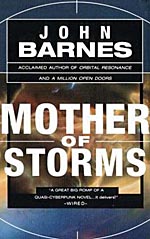
![]() Tar Daddoo
Tar Daddoo
3/22/2013
![]()
What is the Science Fiction Premise?
Mother of Storms offers several Science Fiction premises; I will mention three. First, the book is named for its focus on the formation and effects of a giant hurricane. Second, we are offered a world in which an advanced form of television has become a major telecommunications medium offering its audience the opportunity to think and feel what the actors think and feel. Third, we learn that humans may integrate their mental functions with computer systems.
Is the science of the premise explored?
For the first premise, the science is quite thoroughly explored. I am neither a meteorologist nor a physicist, but the discussions of how hurricanes work seemed quite plausible to me. In fact, it almost seemed like this was not speculation, but well understood science. I doubt that was the case at the limits of extrapolation, but it all seemed quite credible.
As for the advanced television premise, there is very little discussion of how or why it works. There is some discussion of the limits of the technology, but not that much.
Finally, the notion of human-computer integration is explained very little. We are asked to accept that computer and brain programs operate sufficiently similarly that they can cross or transcend the human-computer interface. Beyond that there is little discussion of the rules and limits of this ability.
Is the impact of the premise on an individual explored?
The effects on individuals of all three premises are well explored. The impact of the hurricane on individuals is quite thoroughly explored, both for those experiencing the hurricane and for those who are trying to predict/control it. Indeed, to a first approximation, the story is a monster hurricane disaster story. The impact of a pervasive advanced television medium on individuals is also presented extensively. Here, we can see both the impact on those who receive the "empathic" presentation and those actors who originate the presentations. As for the human-computer integration, it is of enormous consequence to two of the characters in the novel and we are offered an extensive look at how it affects them.
Is the impact of the premise on society explored?
Here again, the impacts of all three premises on society are explored. The author does not stop with portraying the devastating impact of hurricanes on individuals, but looks deeper at what they might mean for the affected governments and even the international order. As for advanced television as a medium, the author is keenly interested in how such a medium might displace other forms of entertainment and information dissemination and how that might change society. Finally, with the human-computer integration premise, we are offered some speculations about how that might impact the future society.
How well written is the story?
I am not sure how to answer this question. On the one hand, I found the story easy to read and actually quite gripping; it was difficult to put it down. On the other hand, I had that somewhat hollow feeling that comes when the deeper purpose of the book might not have been achieved.
As I dissect this reaction, three thoughts come to mind. One possibility is that the book is like a well-designed commercial; it commands your attention even though there is very little being said. This seems unlikely, however, since the author did say a lot and not simply on superficial matters. A second possibility is that I simply did not understand the deeper points being made by the author. This seems somewhat likely, since I was having trouble calibrating the author's views on human nature, politics, and society. Finally, it seems likely that the author was simply too ambitious and blended too many perspectives and issues into one novel.
Can I recommend the book?
As I said above, the book is an easy read and the author is trying to accomplish a lot. I can give it a conditional recommendation, but I feel the reader should be aware of three concerns.
First, the book has a decided emphasis on sex. There are many depictions of sexual interactions, casual, intimate, and, in some cases, violent. In most cases, it serves a point in the story, but I cannot say this is always true. Moreover, the portrayals of sexual violation might be disturbing to anyone who is sensitive to this type of scene. All in all, I would say the author's attitude about sex appears to be
than fits in my comfort zone.
Second, the book is a near-future (2028AD) story with a somewhat elaborate forward-looking history. (It was published in 1994.) Whether you (or the author) like it or not, you will find yourself asking how effectively the author has projected 35 years into the future. The author envisions changes in national and political relationships that have been stable since World War II. Are these changes likely? What do they imply about the author's view of the forces of history? Or politics? Then there is the fact that we are already closer to the story's time period than when it was published. Unlike Orwell's 1984, the details of this intervening history seem to be important to the story. As a result, the story may not age well.
Finally, I found it difficult to understand where the author stood on most issues. I'm not sure this is a bad thing. Indeed, it allowed the author to voice many perspectives on life, human nature, and values, without anointing any particular one. Perhaps all science fiction authors should be able to take a cold look at issues of vigilante justice, despicable behavior, and political intrigue without ever taking a stance on what's right and what's wrong. For my part, it was a little jarring in what I expected to be a simple disaster story about monster hurricanes.
Tar Daddoo